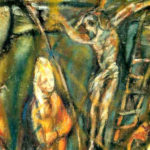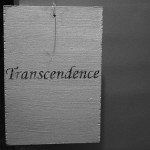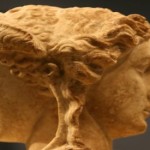We run our website the way we wished the whole internet worked: we provide high quality original content with no ads. We are funded solely by your direct support. Please consider supporting this project.

Does the Lord “Devastate” the Earth?
There is this passage that has sometimes been labeled “Isaiah’s Little Apocalypse” that proclaims how the Lord will “lay waste,” “destroy,” and “ruin” the earth. (The following builds on this previous post which identifies a dual speech pattern of God). It begins with:
The LORD is going to lay waste the earth
and devastate it;
he will ruin its face and scatter its inhabitants (24:1).
Isaiah goes on to decry that “the earth will be completely laid waste and totally plundered” (Isa 24:3) because it has been “defiled by its people” who “have disobeyed the laws” and “broken the everlasting covenant” (vs. 5). Isaiah declares that “a curse consumes the earth” and “its people must bear their guilt” (vs. 6). When free moral agents fall, all that is under their authority falls with them.
Thus far a reader would be justified in assuming that the Lord himself was going to bring about the massive destruction Isaiah speaks of. We get a very different impression, however, if we continue reading, for we soon discover how the Lord planned on bringing about this curse. Relying on the typical ANE conception of anti-creational forces as hostile waters, and using language that is reminiscent of the reversal-of-creation flood account in Genesis, Isaiah proleptically declares:
The floodgates of the heavens are opened,
the foundations of the earth shake.
The earth is broken up,
the earth is split asunder,
the earth is violently shaken (Isa 24:18-9).
These passages indicate that way Yahweh curses the earth is simply by removing the protection (the “floodgates”) that had previously kept hostile cosmic forces at bay. And it is important to notice that, while Yahweh allows these forces to carry out their malevolent designs as a consequence of people’s rebellion, there is no suggestion in this or any other passage that God wanted these forces to be the way they are or that God causes these forces to engage in this destructive activity. To the contrary, Isaiah immediately adds that, once this judgment is complete, Yahweh will “punish the powers in the heavens” and will once again “shut them up” in a “dungeon” and a “prison” (vs. 22).
Just as we have seen God does with violent kings and wicked nations, the sovereign God makes wise use of evil agents as he finds them. But we must never misinterpret God’s willingness to use wicked cosmic forces, wicked nations, and violent kings as indicating his approval of their violence. For as God does in this passage, and as we have seen him do throughout Scripture, once God is done allowing these agents to carry out their destruction, God turns around and punishes them for being the kind of agents he could use for this purpose.
In any event, though it is clear that Yahweh judges the earth in Isaiah 24 by merely withdrawing protection, Isaiah nevertheless depicts him as actively cursing the earth. This passage thus illustrates once again the dual speech pattern that we’ve been discussing. Reflecting his culturally conditioned mindset in which ascribing violence to God was considered the highest form of praise, Isaiah depicts Yahweh doing what in in truth merely allowed.
Photo credit: _Hadock_ via Visual Hunt / CC BY-NC-ND
Category: General
Tags: Cruciform Theology, Judgment
Topics: Interpreting Violent Pictures and Troubling Behaviors
Related Reading

Would God Kill a Baby To Teach Parents a Lesson?
Question: We have a group of guys that are going through your book “Is God to Blame” and a question came up that I would be curious how you would look at it. In the beginning of the book you ask the question “do you really think that God kills babies to teach parents a lesson?”…

Podcast: HOW Does the Death of Jesus Allow Us to Be Forgiven?
Greg discusses love bombs and explosions of light. http://traffic.libsyn.com/askgregboyd/Episode_0419.mp3

Crucifying Transcendence
The classical view of God’s transcendence in theology is in large borrowed from a major strand within Hellenistic philosophy. In sharp contrast to ancient Israelites, whose conception of God was entirely based on their experience of God acting dynamically and in self-revelatory ways in history, the concept of God at work in ancient Greek philosophy…

Judgment and Idolatry
Why was the forbidden tree in the center of the garden called The Tree of the Knowledge of Good and Evil? Since the Bible depicts eating from this tree as the reason humans are estranged from God and the cause of all that’s wrong with humanity, eating from this tree is obviously a terrible thing.…

Caught Between Two Conflicting Truths
In my previous blog I tried to show that adopting a “Christocentric” approach to Scripture isn’t adequate, as evidenced by the fact that people adopting this approach often come to radically different conclusions. In fact, it seems to me that the “Christocentric” label is often close to meaningless inasmuch as it doesn’t meaningfully contrast with anything. If a “Christocentric”…

Podcast: Does the Cruciform Hermeneutic Sabotage Open Theism?
Greg plays Peek-a-Boo with God and considers whether those verses Open Theists use to support Open Theism might simply be times when God is accommodating for us. http://traffic.libsyn.com/askgregboyd/Episode_0236.mp3
